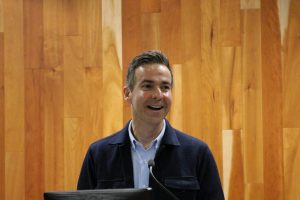Karrigan Monk
Editor-in-Chief
[email protected]
As the audience mingles around the room looking for empty seats, a woman watches over them. She sits in a red dress with a cigarette hanging out of her mouth and a playing card in her right hand.
This woman’s name is Lili Elbe, the star of tonight’s talk. The painting of her displayed on a screen was made by her wife, Gerda Wegener, in 1928.
David Ebershoff, author of The Danish Girl, tells their story. The novel, released in 2000, tells the fictionalized story of Elbe and her journey to be the first person to undergo sex reassignment surgery.

“When Lili Elbe, who inspired my first book The Danish Girl and the film, sat for this painting, she was at a crossroads,” Ebershoff said. “After years of internal struggle, she had finally come to understand who she really was. Assigned male at birth and given the name Einar Wegener, Lili can finally see her true self in the mirror and in portraits like Queen of Hearts, but she was a transgender woman decades before the word transgender existed.”
This story of the Danish transgender woman proved to be imperative to the LGBTQ+ population. In 2017, the New York Times named The Danish Girl one of 25 books which shape LGBTQ+ history.
Ebershoff came to the UNC Asheville campus as part of the English department’s visiting writers series. As the Goodman Endowed Visiting Writer for the spring semester, Ebershoff was extended the invitation by Lori Horvitz, an English professor and director of the women, gender and sexuality studies program.
“Last year at the San Miguel’s Writers Conference in Mexico I attended David Ebershoff’s keynote talk,” Horvitz said. “His presentation about the writing of The Danish Girl was captivating, inspiring and stayed with me. When I returned to Asheville I emailed him and asked if he’d be open to coming to UNCA giving a similar presentation and within the hour he said he would love to come and that was just really generous and kind.”
Ebershoff’s talk at UNCA focused mostly on the writing of The Danish Girl, his first novel. Throughout the event he details his first interaction with Elbe’s story, which he found as a near-parenthetical in a book about gender theory.
The writer said he was struck by her story not only because it showed her profound bravery, but because Ebershoff himself had always assumed Christine Jorgensen, an American, was the first person to have gender reassignment surgery. However, if the book Ebershoff read was correct, Elbe’s story took place nearly two decades before Jorgensen, yet there was little information about her.
Ebershoff said his initial thought was that Elbe’s life would make a great story.
“I was in my mid-20s and I always wanted to be a writer,” Ebershoff said. “At the time — and in some ways still today — I was incredibly shy and self-conscious about my writing. I had no faith in my ability to tell stories or to write well or to write good sentences.”
Ebershoff struggled for months, holding onto Elbe’s story and not knowing what to do with it.
“The mind can tell you a thousand reasons why not to do something, especially maybe the most important things in life. I allowed my mind to speak that way to myself,” Ebershoff said. “I didn’t do anything even though I had done that initial research about her life. I didn’t do anything else yet kept thinking about her. I kept wondering what kind of person would be so brave to take these steps when she had no role models. She had nobody to look to. She had a surgeon who had never done this before. What kind of courage does that require?”
After nearly six months of stewing in the information, Ebershoff said he had a vision in which he saw himself picking up a copy of the New York Times and opening it to see a book review about a novel written about Elbe. He said his fear was not that someone else would write the story, but instead that he was not even going to try.
Though Ebershoff would go on to become vice president and executive editor at Random House, at the time he was still only a junior at the company. He saved up money and his vacation time to take two weeks off to visit Denmark and find Elbe’s story.
When describing what about Elbe’s story resonated so deeply with him, Ebershoff points to his work as an editor. He said, as an editor, he was always looking for stories that had what he called the “uns” — the underrepresented, the untold, the unlikely, the unprecedented, the unusual.
“It goes back to the idea of writing the book I’d want to read. I like to read books where the stakes are high even if those high stakes are very internal to a character who may not seem from the outside a significant figure, but that characters life is huge to that character. I want to read the high stakes about characters I am curious about and whose stories I believe in and whose stories I haven’t quite read before,” Ebershoff said. “My eyes cast not at the obvious winner, but the people at the side. That’s kind of where my heart goes.”
This searching out of untold stories is something Ebershoff hopes to pass onto other writers. As a professor in the MFA program at Columbia University, Ebershoff said he urges his students to write the story they want to read by cannot find.
For Ebershoff, this story was Elbe’s. Though he admits people are different, they still have enough similarities for the writer to empathize with someone who died decades before they were born.
“There will be biological details that are quite different from your own, but the characters that you’re drawn to are going to share some important qualities of yourself,” Ebershoff said. “You’ll find yourself in these characters and then you’ll find some characters that you also want to write about who are fundamentally different.”
The biggest difference between Ebershoff and Elbe is one that has been pointed out several times to him and was brought up by an audience member during his time at UNCA.
“There’s a lot of talk about cultural appropriation these days,” the gentleman said. “I’m curious — given that you’re not transgender how did you navigate that?”
Ebershoff said this was an important question to him and one he did not take lightly, even when beginning his book.
“I understand and totally respect why people raise these questions and I listen to them and I don’t dismiss them,” Ebershoff said. “Some of these questions I asked myself at the outset and some of them — it was 20 years ago. I didn’t quite have the lexicon to think about these questions of appropriation the way we do today. In a basic philosophical sense, I did ask those questions and so I take them seriously and I also understand somebody who lands on a different place and has a different answer than my own.”
Despite their differences, Ebershoff said both he and Elbe found themselves in art. While Elbe found herself not in her own art but in the paintings her wife made of her, Ebershoff said he found himself in books, starting when he was growing up in southern California.
“I saw no version of myself in the media,” Ebershoff said. “The only thing I saw in the media were stories of gay men dying of AIDS and that gay men were sick and that I was going to be sick. That was what I saw. As I tried to figure out who I was, I went to the Pasadena Public Library and when I was an early teen I read my way through that library. I read every book I could find that had any gay characters or what I knew were by gay authors and I found myself in those books.”

Ebershoff said the stories fans tell him of a similar nature are some of the ones that stick out to him the most.
Two stories in particular stuck out to Ebershoff.
The first comes from a trans woman in Europe who received The Danish Girl as a present from her then-wife. Though she was living as a man at the time, this woman saw herself in Elbe’s story and began the transitioning process.
Unfortunately, the transition did not go as smoothly as it could have and she was forced to start her life over in a different country. She was living happily, but Ebershoff said she wrote him to say she was still carrying some of the weight around with her.
It was only until she saw the film based on the book was she able to fully let go.
“She had kind of this double experience with the book and the movie,” Ebershoff said. “That was really powerful to think the story could come into her life at two different periods and really profoundly affect her.”
The second story Ebershoff mentioned came from another trans woman. This woman lived in what Ebershoff described as a very conservative U.S. state. He said he received a letter from the 72-year-old, but the name and return address was under a man’s name. Despite the fact this woman is well into her life, she is unable to transition and live as who she knows she is.
“For her to tell me that the book tells her story and she doesn’t live in Denmark, she lives in a very different environment, that really was one of the most moving things anyone has ever said to me about my writing,” Ebershoff said. “As different as Lili’s story is to this woman’s story, there was some emotional truth she felt truly represented her. It was an incredibly moving story. As a writer, as a creator, as an artist, as important as I think those questions are and as valid as they are, I tend to fall on judging the work.”
Ebershoff said one of the most rewarding things about his work is knowing he helped people like these two women. While this help is more distant and abstract, Ebershoff also does his part to help both the LGBTQ+ population and writers, a cross-section of a group he belongs to himself.
By partnering with the Lambda Literary Foundation, Ebershoff established the Lili Elbe Scholarship which sponsors one up-and-coming transgender writer to attend a two-week writing conference to help them hone their craft.
Ebershoff said he believes finding one’s identity is crucial to being able to live the best life possible. With the scholarship, Ebershoff is doing his part to help others accomplish this for themselves, but it all started with the story of one woman.
“Many of our self doubts and insecurities and anxieties are really about identity,” Ebershoff said. “If you know yourself you will come that much closer to being free. Almost a century ago a Danish woman — though she insisted on calling herself a girl — put her foot on a chair and posed for a portrait with a cigarette and a deck of cards. She shows us her best card, queen of hearts in the painting. She shows us her best self in the painting and she shows what it means to say it to the world.”



















